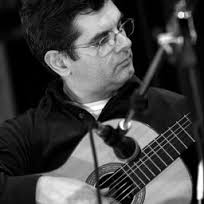About
Music has been part of my life as long as I remember myself.
An eminent member of the Greek guitar fraternity, and a special presence in the field of Greek music, Kostas Grigoréas (Gree-go-ré-as) was born in Athens in 1957. He has studied guitar, theory and music technology. He started his guitar studies at an early age with Yannis Andreopoulos and later joined the class of famous guitarist Dimitris Fampas. He also studied theory of music with Michalis Vourtsis, Nikiforos Nevrakis and Petros Tsitsopoulos (Diploma of Fugue). On graduating with Distinction from the National Conservatory, he continued his studies in England on a British Council scholarship. He studied Guitar and Theory at the Royal Northern College of Music under Gordon Crosskey, John Williams and pianist and conductor George Hadjinikos and was awarded the Postgraduate Diploma of the University of Manchester. His activities include recitals and concerts, composition and song accompaniment; he is a recording artist, producer of recordings and teacher. His long-standing collaborations as classical guitar soloist in concerts as well as recordings include most leading Greek composers and songwriters (Manos Hadjidakis, Mikis Theodorakis, Nikos Mamangakis, Yannis Spanos, Christos Leontis, Notis Mavroudis, Michalis Travlos, Lena Platonos, Kyriakos Tzortzinakis et al.), well-known singers (Savina Yannatou, Aliki Kayaloglou, Maria Dimitriadi, Nena Venetsanou, Anna Parlapanou, Flery Dandonaki, Lakis Pappas, Mariza Koch, Charis Alexiou et al.), as well as many eminent Greek and foreign musicians. He has given recitals and recorded for radio and television in most European countries, America, Africa and the Far East. A composer of ‘rich vision’ (according to top music critic George Leotsakos), he has contributed a substantial oeuvre to the repertoire of Greek instrumental music, with an emphasis on the repertoire of the classical guitar, either as a solo instrument or as part of an ensemble. The bulk of his work has already been presented at concerts, in discography and on the Internet, receiving favourable reviews and applause. Most of his works have been published, either in printed form by PAPAGRIGORIOU-NAKAS or in electronic form by Swiss publishing house MUSICANEO and French publishing house FREE-SCORES. In 2013, his composition “My Sky’, for two guitars, was awarded a prize at an international composition contest with controlled Internet voting, organized by FREE-SCORES. His discography as a composer and/or classical guitar soloist includes works for solo guitar, chamber music, voice and guitar duo and considerable participation in works of contemporary composers. As a teacher, following the great tradition of Greek guitar virtuosi, and teaching both children and adults, he has created a school of distinguished guitarists, most of whom have already embarked on successful professional careers. He teaches, and is director of studies for the guitar department, at the Pythagoreion and Peiramatikon Psychikou conservatories in Athens and at the Polyrhythmia conservatory in the town of Preveza, where he also organizes the “Preveza Music Days” festival. He is a member of the jury at music contests of international prestige. In collaboration with Notis Mavroudis, he is webmaster and editor of “TaR – online musical magazine, mostly on the guitar” ( www.tar.gr/ ) He is a regular member of the Greek Composers’ Union. Official website: www.grigoreas.com
